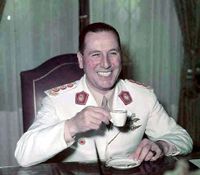Difference between revisions of "Juan Peron"
(Peron's penchant for nationalizing private industries) |
(Instituto Argentino de Promoción del Intercambio) |
||
| Line 8: | Line 8: | ||
He was a member of the [[Justicialist Party]]. While President, Peron was fond of putting government in charge. He nationalized the Merchant Marine,<ref>[https://books.google.com/books?id=CweHgfPIceYC&pg=PA39 The Limits of Convergence: Globalization and Organizational Change in Argentina, South Korea, and Spain]</ref> the banks,<ref>[https://digitalcommons.bard.edu/cgi/viewcontent.cgi?article=1081&context=senproj_s2018 Perón and the Argentine Paradox: An Investigation | He was a member of the [[Justicialist Party]]. While President, Peron was fond of putting government in charge. He nationalized the Merchant Marine,<ref>[https://books.google.com/books?id=CweHgfPIceYC&pg=PA39 The Limits of Convergence: Globalization and Organizational Change in Argentina, South Korea, and Spain]</ref> the banks,<ref>[https://digitalcommons.bard.edu/cgi/viewcontent.cgi?article=1081&context=senproj_s2018 Perón and the Argentine Paradox: An Investigation | ||
into an Economic Mystery]</ref>, the railroads,<ref>[https://nationalarchives.gov.uk/documents/general-peron.pdf General Perón and the nationalisation of railways in Argentina]</ref>, the telephone system,<ref>[https://worldpolicy.org/wp-content/uploads/2010/03/SAEN-2002-Argentina-struggles-stem-from-Per%C3%B3n-and-patronage.pdf Argentina struggles stem from Perón and patronage]</ref>, and he also nationalized many utility companies.<ref>[https://economics.yale.edu/sites/default/files/files/Workshops-Seminars/Economic-History/alston-071114.pdf Electoral Fraud, the Rise of Peron and Demise of Checks and Balances in | into an Economic Mystery]</ref>, the railroads,<ref>[https://nationalarchives.gov.uk/documents/general-peron.pdf General Perón and the nationalisation of railways in Argentina]</ref>, the telephone system,<ref>[https://worldpolicy.org/wp-content/uploads/2010/03/SAEN-2002-Argentina-struggles-stem-from-Per%C3%B3n-and-patronage.pdf Argentina struggles stem from Perón and patronage]</ref>, and he also nationalized many utility companies.<ref>[https://economics.yale.edu/sites/default/files/files/Workshops-Seminars/Economic-History/alston-071114.pdf Electoral Fraud, the Rise of Peron and Demise of Checks and Balances in | ||
| − | Argentina]</ref> Additionally, the Institute for the Promotion of Trade(IAPI) was formed as a [[Single payer]] organization for grains, seed, and beef,<ref>[https://www.forbes.com/sites/realspin/2015/01/30/perons-legacy-inflation-in-argentina-and-an-institutionalized-fraud/ Perón's Legacy: Inflation In Argentina, An Institutionalized Fraud]</ref> and formed an important part of his [[Five-Year Plan]].<ref>[http://content.time.com/time/magazine/article/0,9171,934050,00.html ARGENTINA: Five-Year Plan]</ref><ref>[https://books.google.com/books?id=RPWSAgAAQBAJ&pg=PA95 The Military and Domestic Politics: A Concordance Theory of Civil-Military Relations]</ref> | + | Argentina]</ref> Additionally, the Institute for the Promotion of Trade(IAPI)<ref>Instituto Argentino de Promoción del Intercambio</ref> was formed as a [[Single payer]] organization for grains, seed, and beef,<ref>[https://www.forbes.com/sites/realspin/2015/01/30/perons-legacy-inflation-in-argentina-and-an-institutionalized-fraud/ Perón's Legacy: Inflation In Argentina, An Institutionalized Fraud]</ref> and formed an important part of his [[Five-Year Plan]].<ref>[http://content.time.com/time/magazine/article/0,9171,934050,00.html ARGENTINA: Five-Year Plan]</ref><ref>[https://books.google.com/books?id=RPWSAgAAQBAJ&pg=PA95 The Military and Domestic Politics: A Concordance Theory of Civil-Military Relations]</ref> |
After the bombing of the Plaza de Mayo in 1955, Perón was overthrown that same year. | After the bombing of the Plaza de Mayo in 1955, Perón was overthrown that same year. | ||
Revision as of 01:03, September 20, 2019
Juan Domingo Perón (1895–1974) was the brutal dictator of Argentina from 1946 to 1955 and from 1973 to 1974. As head of an army group, he helped to overthrow Ramon Castillo in 1943. During his first Presidency, he was married to Eva Perón, the subject of the musical Evita, who was very popular with the people.
Peron was very anti-American and had close ties to Nazi Germany. He was excommunicated from the Catholic Church in case of his anti-Christian laws. Peron legalized divorce and Prostitution and he banned religious instruction in public schools.[1]
Church and army opposition to corruption and repression forced Perón into exile in 1955, but he returned in 1973 to serve briefly as President once again.
He was a member of the Justicialist Party. While President, Peron was fond of putting government in charge. He nationalized the Merchant Marine,[2] the banks,[3], the railroads,[4], the telephone system,[5], and he also nationalized many utility companies.[6] Additionally, the Institute for the Promotion of Trade(IAPI)[7] was formed as a Single payer organization for grains, seed, and beef,[8] and formed an important part of his Five-Year Plan.[9][10]
After the bombing of the Plaza de Mayo in 1955, Perón was overthrown that same year.
Perón went into exile in Paraguay, Panama, Nicaragua, Venezuela, the Dominican Republic and finally in Spain.
His second wife, a fascist named Eva Perón, supported him from 1946 to 1952, when she died of uterine cancer.
In 1961 he married María Estela Martínez in Spain, who later accompanied him as vice president in 1973 and succeeded him in his death.
See also
Sources
- The New American Desk Encyclopedia, Penguin Group, 1989
- ↑ http://www.historytoday.com/richard-cavendish/juan-per%C3%B3n-overthrown
- ↑ The Limits of Convergence: Globalization and Organizational Change in Argentina, South Korea, and Spain
- ↑ [https://digitalcommons.bard.edu/cgi/viewcontent.cgi?article=1081&context=senproj_s2018 Perón and the Argentine Paradox: An Investigation into an Economic Mystery]
- ↑ General Perón and the nationalisation of railways in Argentina
- ↑ Argentina struggles stem from Perón and patronage
- ↑ [https://economics.yale.edu/sites/default/files/files/Workshops-Seminars/Economic-History/alston-071114.pdf Electoral Fraud, the Rise of Peron and Demise of Checks and Balances in Argentina]
- ↑ Instituto Argentino de Promoción del Intercambio
- ↑ Perón's Legacy: Inflation In Argentina, An Institutionalized Fraud
- ↑ ARGENTINA: Five-Year Plan
- ↑ The Military and Domestic Politics: A Concordance Theory of Civil-Military Relations
